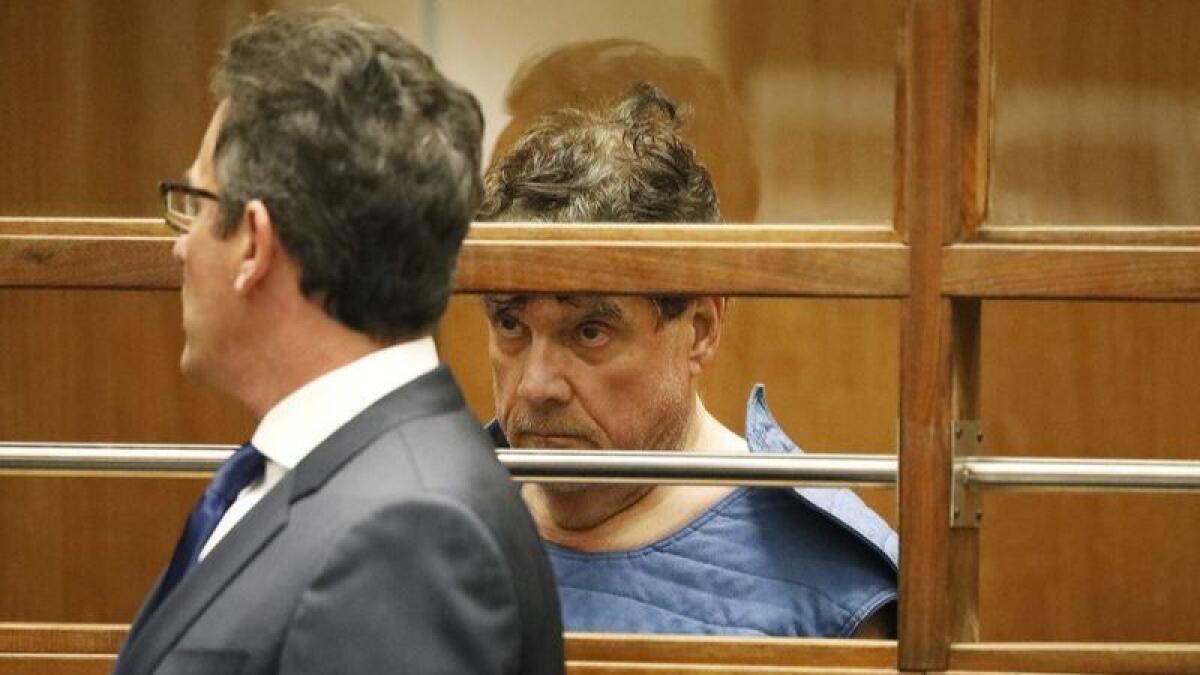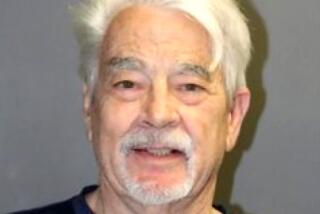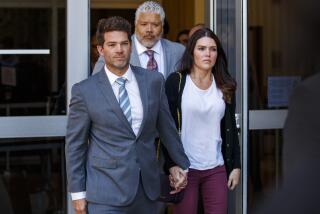Prosecutors face challenges as they move to prove Tyndall allegations, experts say

A dozen investigators have amassed a trove of evidence against former USC gynecologist George Tyndall over the last year. They’ve interviewed hundreds of women who described disturbing behavior, from lurid comments to inappropriate touching, and collected photos the doctor kept of nude women — taken in what appeared to be a medical exam room.
But as prosecutors now prepare to prove the abuse allegations in court, legal experts say the criminal case is by no means a slam dunk.
“What Tyndall’s going to say is: ‘You might question my medical judgment, but that doesn’t make me a criminal,’” said Laurie Levenson, a professor at Loyola Law School.
Tyndall was taken into custody last week and charged with committing more than two dozen felonies against 16 women at the campus clinic where he practiced for nearly three decades. The charges came a year after The Times revealed that Tyndall had been the subject of numerous complaints over his tenure from female students and staff.
Tyndall pleaded not guilty during a brief court appearance Monday, in which he wore a suicide prevention gown and had his wrists shackled to a chain around his waist.
The charges against him involve alleged incidents between 2009 and 2016, the last seven of Tyndall’s 27 years at the university, but represent only a tiny fraction of the allegations made to police and prosecutors by nearly 400 women.
“We hear 100, 200, 400 complaining witnesses. Well, without minimizing a number, we’re down to 16,” Andrew Flier, one of Tyndall’s defense attorneys, said after Monday’s hearing. “There’s a big difference between how it started, no matter how long ago, and now we’re down to allegedly 16 individuals.”
Experts said that number signals that prosecutors have zeroed in on their strongest cases with the most corroborating evidence. And even with just 16 victims, Tyndall still faces up to 53 years in prison if convicted as charged.
“The guy’s in his 70s so chances are he’s not going to be getting out,” said Dmitry Gorin, a former L.A. prosecutor who now works as a defense attorney but is not involved in this case. “It’s essentially a life sentence if they can prove the case.”
Dist. Atty. Jackie Lacey said some cases are too old to prosecute and others aren’t supported by enough evidence, but that more charges are likely. The women in the complaint ranged in age from 17 to 29 at the time they saw Tyndall, police said.
Prosecutors may face challenges with the lack of physical evidence in the cases and when the women came forward to complain.
“In rapes or other types of assaults you may have bruising, cutting or other physical injuries,” Gorin said. “This is more manipulation by a doctor of a patient and the patient’s perception that something was done wrong, and the doctor, saying, ‘Wait a minute, I was just giving you an OB exam.’”
The defense may also seek to bring as character witnesses other patients who were examined without any problems or argue that the victims exaggerated their claims in hopes of getting a civil payout.
But the case also presents challenges for Tyndall’s defense attorneys. Lacey suggested that her office could introduce women beyond the 16 accusers to support their stories.
That’s what happened in Bill Cosby’s criminal case. The actor was charged with drugging and molesting only one woman, but five of the 50 women who came forward with allegations against him were allowed to testify during his trial. Cosby was eventually convicted of three counts of aggravated indecent assault.
“The government is going to say look at all these patients claiming the same thing, that they were sexually assaulted by their doctor,” Gorin said of Tyndall’s case. “The government is going to rely on the numbers.”
Legal experts said the case could also boil down to a battle of medical experts and their analyses of appropriate techniques for certain gynecological exams.
RELATED: USC was told gynecologist could be preying on Asian women, secret records show »
“The fight becomes: Do these facts represent something criminal? And that’s where your experts come in,” said former Los Angeles County Dist. Atty. Steve Cooley.
For example, Gorin said, “if you’re not using gloves, that’s strange from a medical perspective. If you’re trying to cover what you’re doing from … a nurse, that’s strange.”
Flier told reporters that his client always used gloves and always had a chaperone in the room with him while he performed exams.
“We have medical evidence and testimony that we are gonna show that he followed all the rules,” Flier said, later adding that all the procedures were legitimate. “We have doctors to confirm that. We have the medical literature and journals to confirm that. We have the chaperones that would’ve complained if he did anything inappropriate at the time. None of this ever happened.”
Since The Times’ report, the state medical board has moved to strip Tyndall of his license, and USC has agreed to a $215-million federal class-action settlement with former patients. More than 700 additional suits against the university are winding their way through state court.
Tyndall has denied wrongdoing and said that his treatment of patients was consistent with good medical care. “He’s always been 100% adamant that he has never done anything wrong in these specific examinations, and he’s never waffled one time from that,” Flier said.
Among the accusations were that he touched women inappropriately during pelvic exams, made suggestive and lewd comments about their bodies and photographed their genitals for purposes colleagues found dubious.
He was allowed to continue treating students until 2016, when a nurse, frustrated by administrative inaction, complained to a rape crisis counselor.
Tyndall was placed on paid leave, and university lawyers and administrators reached a secret deal with him a year later under which he left USC with a financial payout and a clean record with the medical board.
Prosecutors initiated grand jury proceedings, which are secret, but ended up filing charges in court papers, the more common route. Cooley said it’s not uncommon for a grand jury to be used for investigative purposes, allowing prosecutors to question witnesses and test their credibility in a confidential proceeding.
Tyndall was charged with 18 counts of sexual penetration of an unconscious person. As explained in court papers, the charge relates not to the victims’ state of wakefulness but instead to their lack of understanding of the gynecologist’s motivations, specifically that he had “no professional purpose” in touching them during pelvic exams.
He also faces 11 counts of sexual battery by fraud for touching an “intimate part” of a patient “for the purpose of sexual arousal” and under the guise of a “professional purpose,” according to the criminal filing.
Flier said his client is not suicidal, but that the gown he wore in court Monday was for his own protection.
Tyndall is due in court for a bail review hearing Wednesday. His attorney has asked a judge to reduce his nearly $2.1-million bail, saying Tyndall does not have a passport, a criminal history or an active medical license, and is not a flight risk or a danger to the public. Tyndall, who has fielded threats to his safety, would not object to home detention, Flier said.
“There’s absolutely no reason to keep him in,” Flier said in court. “I think bail’s being used as a weapon in this case.”
alene.tchekmedyian@latimes.com
Twitter: @AleneTchek
More to Read
Sign up for Essential California
The most important California stories and recommendations in your inbox every morning.
You may occasionally receive promotional content from the Los Angeles Times.







